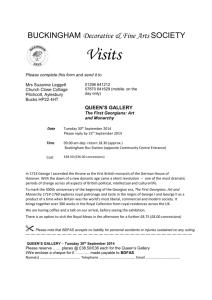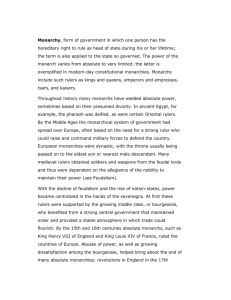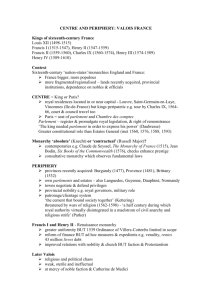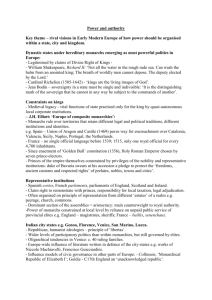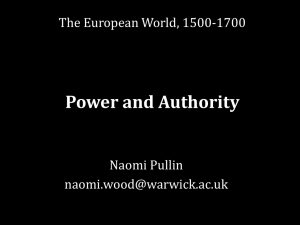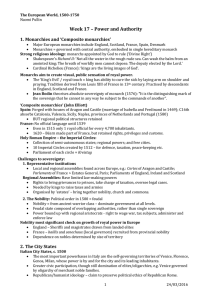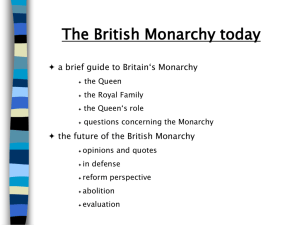Constitutional monarchy is a system of government in which a
advertisement
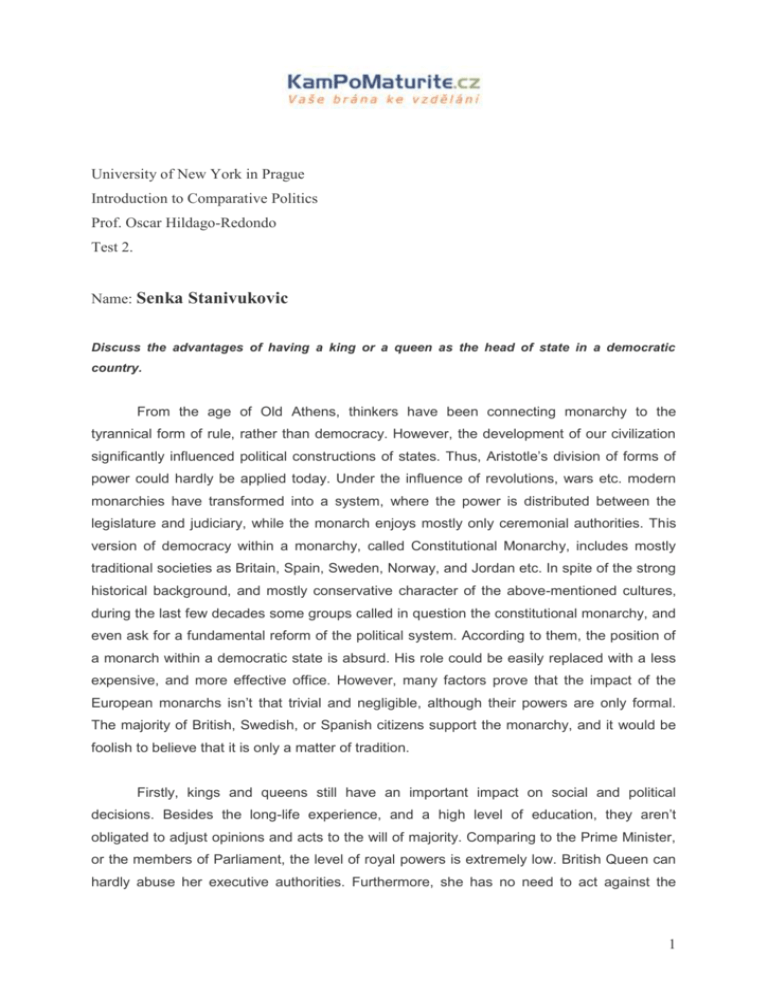
University of New York in Prague Introduction to Comparative Politics Prof. Oscar Hildago-Redondo Test 2. Name: Senka Stanivukovic Discuss the advantages of having a king or a queen as the head of state in a democratic country. From the age of Old Athens, thinkers have been connecting monarchy to the tyrannical form of rule, rather than democracy. However, the development of our civilization significantly influenced political constructions of states. Thus, Aristotle’s division of forms of power could hardly be applied today. Under the influence of revolutions, wars etc. modern monarchies have transformed into a system, where the power is distributed between the legislature and judiciary, while the monarch enjoys mostly only ceremonial authorities. This version of democracy within a monarchy, called Constitutional Monarchy, includes mostly traditional societies as Britain, Spain, Sweden, Norway, and Jordan etc. In spite of the strong historical background, and mostly conservative character of the above-mentioned cultures, during the last few decades some groups called in question the constitutional monarchy, and even ask for a fundamental reform of the political system. According to them, the position of a monarch within a democratic state is absurd. His role could be easily replaced with a less expensive, and more effective office. However, many factors prove that the impact of the European monarchs isn’t that trivial and negligible, although their powers are only formal. The majority of British, Swedish, or Spanish citizens support the monarchy, and it would be foolish to believe that it is only a matter of tradition. Firstly, kings and queens still have an important impact on social and political decisions. Besides the long-life experience, and a high level of education, they aren’t obligated to adjust opinions and acts to the will of majority. Comparing to the Prime Minister, or the members of Parliament, the level of royal powers is extremely low. British Queen can hardly abuse her executive authorities. Furthermore, she has no need to act against the 1 people, or be influenced by the changing political trends. Therefore, as traditional authority, she only indirectly influences public opinion, as well as some legislative governmental decisions. Secondly, the royal family, especially in a case of the United Kingdom, became an essential part of national features. Together with the royal anthem, flag, and some mutual customs, the Queen symbolizes the unity and sovereignty of the United Kingdom (The crown reinforces historical and political bound between England, Scotland, Wales, and Northern Ireland). Also, the members of the Commonwealth strongly approve constitutional monarchy. For them the crown is more than an institution. Even today, when the word is becoming a global village, and multiculturalism is one of the main characteristics of many societies, the Queen reminds Canadians and Australians on their origin and historical heritage. Thirdly, besides political advantages, queens and kings help in the economical growth of monarchies. Tourism is one of the main industrial branches of the UK, and the Netherlands. Besides scenic spots, and architectural achievements, these countries became main tourist destinations because of the traditional royal ceremonies, manifestations, royal palaces etc. Furthermore, one of the unofficial duties of all members of royal families is charity work. They are often presidents of welfare organizations and events. Finally, they are the modern patrons of art. Besides financial support to the artists, they provide means for art projects and cultural events. In brief, the royal family’s contribution to the society is extremely high. Therefore, in spite of the fact that a negative attitude towards royal families exists, their social and cultural involvement, and economical contribution can’t be denied. Finally, historical events acknowledge constant development of European monarchies. Especially in the 20th century, when the world was facing social revolutions, wars, and fundamental changes, the crown provided monarchies stability and prosperity. Although it would be wrong to claim that European monarchies haven’t gone through some changes, they were definitely calmer and less extreme comparing to other countries. In conclusion, constitutional monarchies as the UK, Sweden, and the Netherlands are the most developed democracies today. Thus, it would be absurd to ask a revolutionary replacement of this system with some other form of rule. The interference of monarchs in the political life of those countries is minimal, and it doesn’t repress the development of democracy at all .On the contrary, modern royal families benefit the society from economical, cultural, moral, and political point of view. Therefore, as long as the majority supports the king/queen as the head of the state, no radical change should be performed. 2
